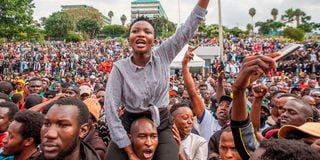Report: Youth participation in politics limited to voting, demos

Revelers during the Shujaaz Memorial concert held on July 7, 2024 at Uhuru Park in Nairobi.
A majority of youth do not participate in any political activity other than voting in elections, revealing high political apathy, a new report has shown.
The report by Inuka Kenya, a grassroots social movement organisation, indicated that political participation of the youth is limited to demonstrations called by the opposition.
According to the report, only 21.8 percent of the youth take part in political activities, leaving the majority (78.2 percent) as voting machines during polls.
The survey, conducted in three counties of Nairobi, Mombasa and Kisumu, showed that the youth engagement in politics is limited to voter mobilisation where they act as agents and security personnel for leaders vying for political offices.
“Some of the young people indicated that they took part in maandamano (protests) called by the opposition Azimio coalition,” said lead consultant Jared Ontita.
Despite some being members of political parties, their participation is limited because they are not facilitated (by the parties) to take part in political activities.
The report indicated that only 7.3 percent of the 1,535 young people between the ages of 15 and 35 surveyed, said youth receive frequent facilitation to participate in political activities.
On the other hand, a staggering 64.4 percent said political parties do not facilitate participation of the youth in their outfits.
The result, said Mr Ontita, is that a majority of the youth get discouraged from joining political parties hence limiting their participation in politics.
According to the survey, 981 out of 1,535 young people surveyed said they are not affiliated with any political party, pointing to violence and negative energy associated with politics.
“In Nairobi County, politics is perceived as being closely associated with wealth. They believe that without substantial financial resources, engaging in politics is pointless,” said Mr Ontita.
“Another reason the young people mentioned for their unwillingness to join political parties is that they believe these parties mainly serve the interests of a few individuals seeking political seats. They are only active during elections, with their branch offices usually closed at other times.”
The survey pointed out that most political parties do not have a structured youth wing and even for those with formalised structures for youth inclusion, the structures only become active during election periods.
Low voter turnout
Dubbed the Civic Voice project, the survey is a response to Kenya’s August 2022 elections, which saw lower youth participation and the lowest voter turnout in 15 years with the low turnout mainly due to voter apathy between the 18 and 35 age group.
Mr Ontita said political participation involves the voluntary activities that the general public undertakes to influence public policy, either by directly impacting it or by affecting the selection of individuals who create policies.
Examples of such activities include voting in elections, assisting political campaigns, donating money to a candidate or cause, contacting officials, petitioning, protesting, and collaborating with others on issues.
Young people have shown increasing apathy towards civic and political activities in recent years with the trend worsened by the country’s social and economic struggles, including the slow recovery from Covid-19 pandemic and poor resource management.
The lead consultant argued that young people face significant structural barriers that hinder their involvement in civic and political activities with the absence of a national legal framework to guide and facilitate public participation being a major issue.
He said that although some county governments have attempted to create policies and guidelines, implementation remains a significant challenge.
The results showed that 65.5 percent of young people across the counties did not attend any civic forums, although they are aware that democracy is based on public participation, raising questions about their interest in civic participation.
“The results show that when voter and civic education is ignored until the end of the election cycle, young people and the general population lack an understanding of political decision-making. As a result, they might not be active and informed citizens,” said Mr Ontita.
“It is crucial to understand that just because people participate in a process does not mean their opinions will always prevail.”
Scepticism
The survey indicated a general feeling of scepticism among young people in engaging in civic activities, as well as a lack of trust between them and the authorities and a sense that their respective governments do not take them or their suggestions seriously.
“When asked whether the young people feel that their voices are heard and their ideas and issues are captured for decision-making processes, they felt that their respective county governments only partially listen to the young people,” said Samuel Ngonela, associate consultant.
He said age consistently emerged as a strong indicator of political engagement, with younger individuals being less likely to vote or participate in civic activities than older generations.
Mr Ngonela argued that to engage young people meaningfully, they must be actively involved in activities that go beyond their own interests.
This includes collaborating with programme developers and managers in various policy cycle stages, such as agenda setting, design, policy implementation, monitoring, and evaluation.
He added that education also plays a crucial role in determining political participation, as higher levels of education are linked to increased engagement in politics.
“Wealth and income play a role in influencing political participation. Typically, privileged social groups are more actively involved in politics due to the associated costs of participation,” he said.
The survey employed the use of both quantitative and qualitative data collected across the three targeted counties using questionnaires distributed through a combination of virtual and in-person views.
The study used simple random sampling to select respondents for quantitative data collection.





